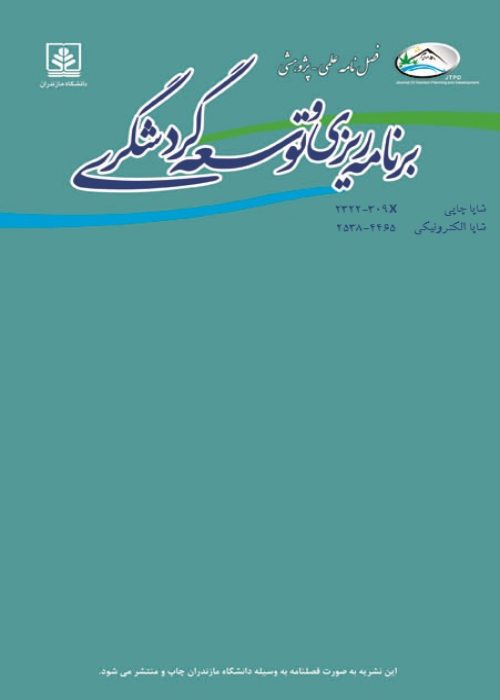Tourism and Foreign Tourists Rights under International Law
Author(s):
Article Type:
Research/Original Article (دارای رتبه معتبر)
Abstract:
Though international law has not benefited from binding regulations in tourism yet, there exists applicable rules related to the aliens and tourists rights among general and soft law. The present descriptive-analytic research indicates that the right to leisure as an already affirmed human right in the international documents can be generalized to the tourism. International tourists should obey the internal obligatory rules of the host countries without any discrimination. From the international law perspective the principle of counter measure to the extent that does not violate the fundamental rights (as being erga omnes in nature) is an important principle related to the international tourists rights. The right of freedom of travel is a further principle which is an affirmative right to tourism. This papers result shows that according to the present international law view, at first, tourists deserve to benefit from the fundamental rights such as the right to live and the right of access to fair judge that can be achieved through consular support, regardless of necessarily any mutual contract. Secondly, there are more specific rights that host governments and travel agencies should assure, among these are: the right to have access to information (including of travel and possible risks), official, judicial, and health services, and foreign exchanges, which are supported in the global code of ethics for tourism.
As UNWTO defines:" Tourism comprises the activities of persons travelling to and staying in places outside their usual environment for not more than one consecutive year for leisure, business and other purposes not related to the exercise of an activity remunerated from within the place visited." Alongside with other fundamental human rights such as the right to live and freedom of movement the right to travel is also essential and intrinsic to human nature. Foreign tourists as aliens with various aims such as visiting, fun, treatment or else travel to a country and bring the benefit of foreign exchange to the host country. Tourism relates to travel and leisure and requires a systematic net of protection services, among these a systematic law system is a prerequisite.
Discussion and
International human right recognizes a foreign tourist as an alien who should benefit from fundamental rights, except some of the political and social rights such as voting, or acting as a candidate. There are also some rights listed as unbinding documents that have to be made as binding contracts or recognized and written as citizenship rights or domestic law by nations otherwise may bring them international responsibility.
International law society may induce those common practiced regulations of individual nations in tourism for integrating them in to the international potentially binding regulations.
Introduction
For meeting efficient development in tourism, paying attention to legal aspects is a crucial fact and requires a systematic and complex programming in this regard.As UNWTO defines:" Tourism comprises the activities of persons travelling to and staying in places outside their usual environment for not more than one consecutive year for leisure, business and other purposes not related to the exercise of an activity remunerated from within the place visited." Alongside with other fundamental human rights such as the right to live and freedom of movement the right to travel is also essential and intrinsic to human nature. Foreign tourists as aliens with various aims such as visiting, fun, treatment or else travel to a country and bring the benefit of foreign exchange to the host country. Tourism relates to travel and leisure and requires a systematic net of protection services, among these a systematic law system is a prerequisite.
Materials And Methods
This project through an analytical-descriptive method tries to discuss about the existing law principles and rules in tourism field in a regular conceptual frame according to international law. The results extracted logically from binding or unbinding legal documents. For this purpose by presenting different views about foreign tourist rights, the relation between this right, the sovereignty of governments and other related legal international principles are discussed in a human right perspective. Finally a foreign tourist right as an alien versus a tourist is comparedDiscussion and
Results
International law as a regulatory system over the international actors behavior provides special guidelines and standard rules in relation to aliens and nationals. Not in violation with sovereignty of governments in controlling arrivals and departures, the principle of freedom without discrimination, the right of movement, the right for leisure including tourism as an essential right for safeguarding human health and dignity promotes the nations to regulate and obey the standard rules. On the other hand some of the international law doctrines like countermeasures, proportionality and the necessity of protection of fundamental rights are applicable.International human right recognizes a foreign tourist as an alien who should benefit from fundamental rights, except some of the political and social rights such as voting, or acting as a candidate. There are also some rights listed as unbinding documents that have to be made as binding contracts or recognized and written as citizenship rights or domestic law by nations otherwise may bring them international responsibility.
International law society may induce those common practiced regulations of individual nations in tourism for integrating them in to the international potentially binding regulations.
Conclusions
As far as our country-Iran is concerned, there is a need to regulate and adapt the rules in such a way that confirm to UNWTO paradigms especially The Global Code of Ethics for Tourism. For example in the cases of articles 6 and 8 in providing for foreign tourists the possibility of access to available forms of communication; easy access to local and administrative, legal and health services. They also should be free to contact their consular representatives, and have access to places of transit and stay and to tourism and cultural sites without being subject to excessive formalities or discrimination.Keywords:
Language:
Persian
Published:
Journal of Tourism Planning and Development, Volume:6 Issue: 23, 2018
Pages:
155 to 170
magiran.com/p1806674
دانلود و مطالعه متن این مقاله با یکی از روشهای زیر امکان پذیر است:
اشتراک شخصی
با عضویت و پرداخت آنلاین حق اشتراک یکساله به مبلغ 1,390,000ريال میتوانید 70 عنوان مطلب دانلود کنید!
اشتراک سازمانی
به کتابخانه دانشگاه یا محل کار خود پیشنهاد کنید تا اشتراک سازمانی این پایگاه را برای دسترسی نامحدود همه کاربران به متن مطالب تهیه نمایند!
توجه!
- حق عضویت دریافتی صرف حمایت از نشریات عضو و نگهداری، تکمیل و توسعه مگیران میشود.
- پرداخت حق اشتراک و دانلود مقالات اجازه بازنشر آن در سایر رسانههای چاپی و دیجیتال را به کاربر نمیدهد.
In order to view content subscription is required
Personal subscription
Subscribe magiran.com for 70 € euros via PayPal and download 70 articles during a year.
Organization subscription
Please contact us to subscribe your university or library for unlimited access!



